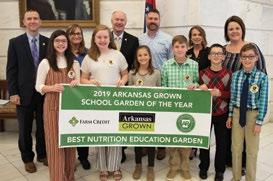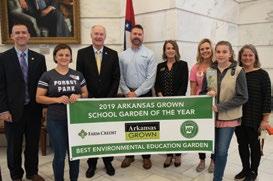
5 minute read
Farm to School: How Does Your Garden Grow?
from Arkansas Grown
Farm to School Program Teaches Children Where Their Food Comes From
The Arkansas Farm to School program is a value to the state’s students for the nutritional and educational opportunities alone. Yet, a closer look at the emerging program in Arkansas schools shows even more to love, according to Emily English, a pediatrics professor and research director of the Access to Healthy Foods Research Group at the Arkansas Children’s Research Institute. “The thing about Farm to School that’s so awesome is that it’s a cross-sectional opportunity to not just change kids, but also to help farmers, our local producers, and communities of staff and faculty who are touched by this work,” English said. Individual local programs may consist of one or more of these elements: procurement, where schools purchase local foods and serve them to students in the cafeteria, as a snack or as a taste test; education, where the curriculum is connected to food, health, and nutrition; or school gardens, where students learn skills through tending their own gardens. “We are building engagement among students, teachers, administrators, parents, and farmers. I love that,” English added. “It has these multi-level benefits, whether it’s nutrition and public health or seeing dollars stay in the state.” The state currently has almost 50 schools and nearly 100,000 students participating in some Farm to School practices, with the program poised to grow. Legislation sponsored by Rep. Mary Bentley and Sen. Gary Stubblefield was enacted in 2019 to establish a statewide program coordinator for the Arkansas Farm to School initiative. “Although we have had pockets of Farm to School programs across the state for years, I knew it was vital that we have a program coordinator in the Arkansas Department of Agriculture who could bring procurement and school programs together,” Bentley said. “I appreciated the support of my colleagues in the legislature this past session approving the necessary funding to make this position a reality.” The coordinator is employed by the Arkansas Department of Agriculture and will play a key role in facilitating new connections between farmer and educator. Sarah Lane, the new coordinator, served as a FoodCorps service member within the Conway School District at Carolyn Lewis and Ida Burns Elementary, supporting the district’s school garden and nutrition education efforts. Lane has a master’s degree in teaching. “There is something magical when a child pulls a carrot from the ground for the first time, tastes the spice of a locally grown radish, tours a farm during a school field trip, or learns how fruits and vegetables fuel their body in a hands-on math lesson,” Lane said. “The happiness of children engaged in Farm to School roots me in this work, and I couldn’t be more excited to step into this role.” “The thing about Farm to School that’s so awesome is that it’s a crosssectional opportunity to not just change kids, but also to help farmers.”
Advertisement
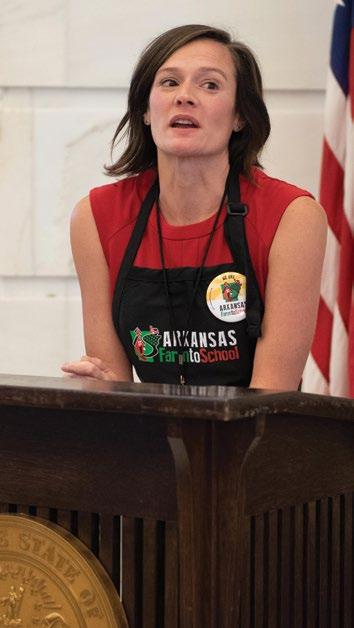

English said Arkansas was behind the curve in creating a full-time, state-funded position for the program, but the state is seen as a leader in many other programming aspects. First contemplated as part of a statewide conference at Heifer International in Little Rock in 2009, this year marked a ten-year milestone for the program.
In 2011, the Arkansas Children’s Research Institute received some of its first research dollars directed toward better understanding the benefit of Farm to School strategies. The Institute has been the state’s lead agency responsible for the framework of the program.
“Over the last ten years, we’ve been trying to do a lot of training and technical assistance, capturing data showing that people are interested in this work,” English said. “When Farm to School is implemented at a school, kids are more likely to participate in school lunch or try fruits and vegetables.”
“There are several success stories throughout the state,” English said. The Fayetteville School District is a great example of a district that procures local food for use at the cafeteria salad bar and as fruit in a parfait snack.
School gardens are an integral part of the curriculum in districts like North Little Rock, Yellville-Summit and Magnet Cove.
English concludes, “When a garden is written into the fabric of the school, it gives hands-on experience to tie concepts together. It uses a garden, agriculture, and food as the curriculum and learning lab. Kids who grow tomatoes are more likely to taste them.”

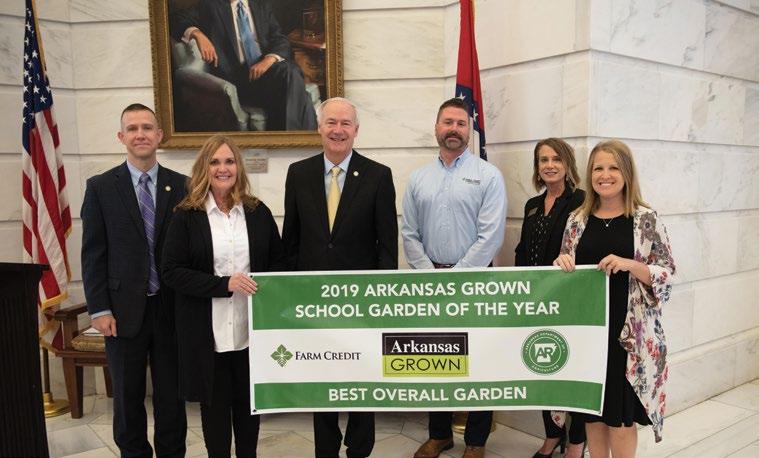
2019 Arkansas Grown School Garden of the Year - Pike View Early Childhood Center, North Little Rock
Best Community Collaboration Garden Marshall Elementary, Marshall
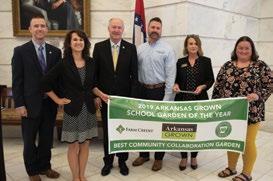
The annual School Garden of the Year contest is sponsored by Farm Credit Associations of Arkansas and the Arkansas Department of Agriculture. The contest started in 2014 to promote the importance of involving young people in the process of fresh food production and cultivation. Any Arkansas school, grades K-12, with a working school garden during the 2018-2019 school year, or a startup proposal for the 2019-2020 school year was eligible to apply. Not pictured: Best School Garden Start-up Proposal: Springdale High School. Program details available at: agriculture.arkansas.gov/aad-programs/
Best Nutrition Education Garden Sheridan Intermediate, Sheridan
